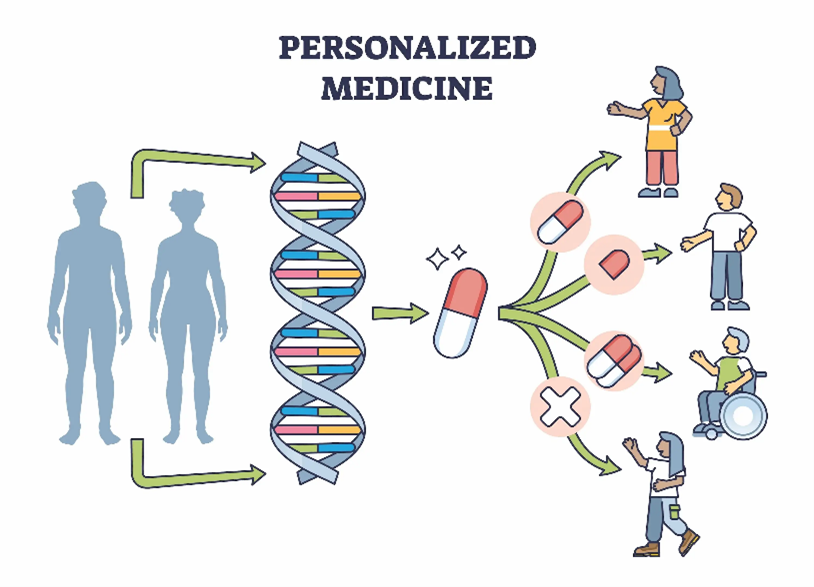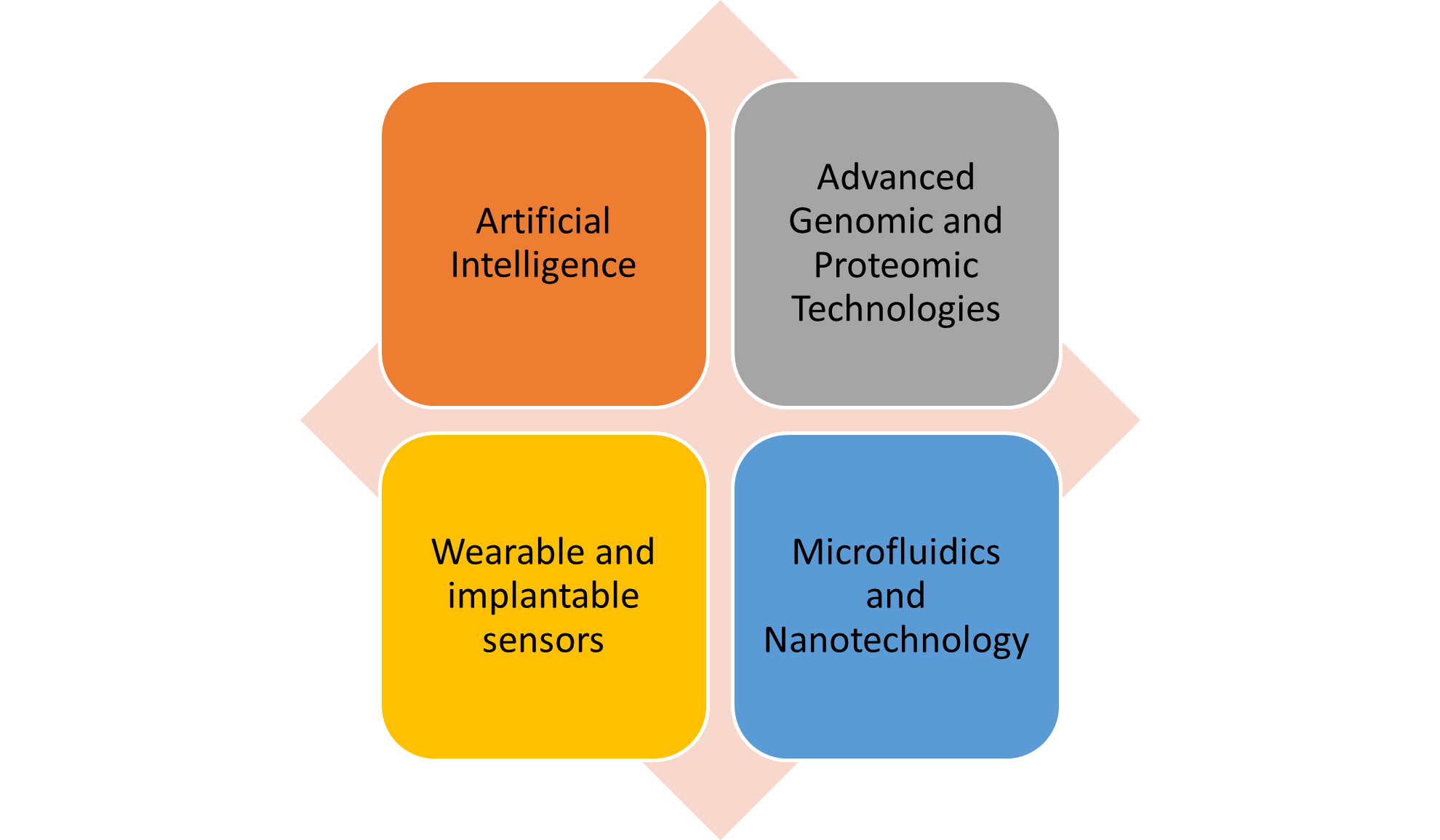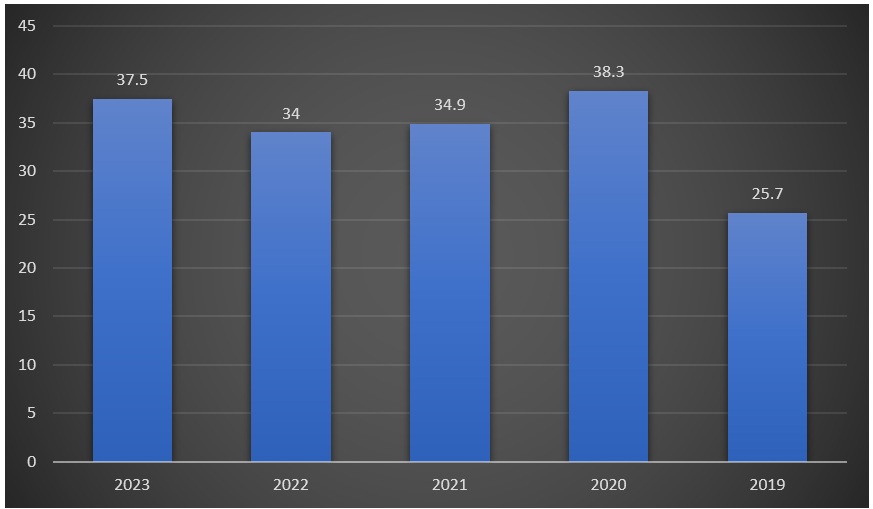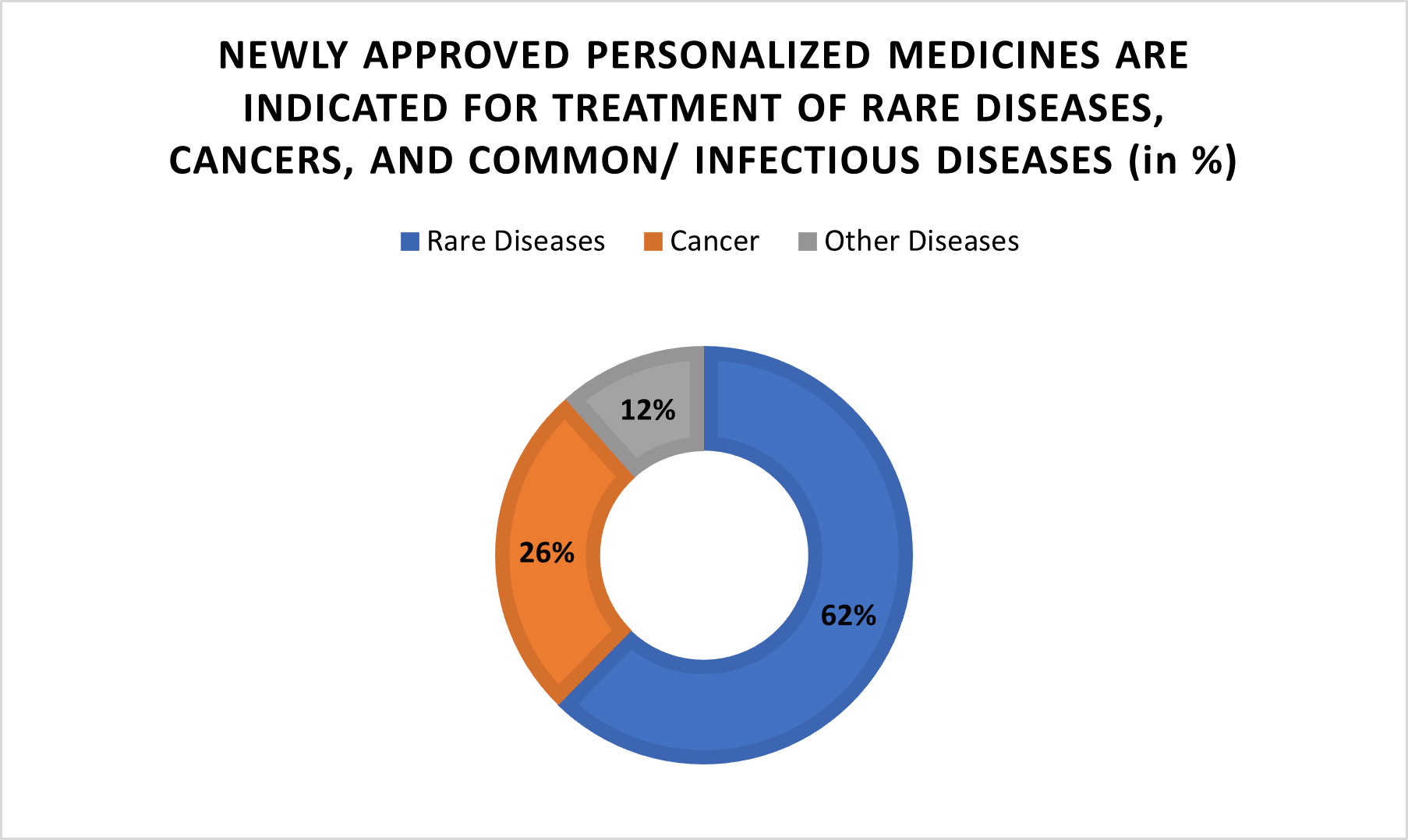Introduction:
- Personalized medicine is the modification of medical treatment according to individual characteristics of each patient. The approach rests on scientific advances in knowing how a certain biochemical and genetic makeup predisposes people toward various diseases. This same research is enhancing our capacity to forecast which treatments will work for an individual patient and which ones and be ruled out.
- Personalized medicine can actually be viewed as modification of the previous understanding and dealing with the disease. With the more accurate tools in their hands, the doctors are able to choose therapies or treatment regimens that can be matched with the molecular profile of a patient that would not only limit the possible adverse effects of treatment and enhance the chances of success, but would also reduce the costs compared with a disease treatment based on a "trial and error" methodology.

Personalized Medicine Is Impacting Patient Care in Many Diseases. For Example.
Breast Cancer
Trastuzumab came as one of the first examples of personalized medicine. This is a kind of breast cancer That because of over expression of a protein HER2 does not respond to standard therapy in approximately 30 percent of patients. Tumor positive for HER2 were approved for trastuzumab in 1998 but in 2005 further studies revealed that it was helpful alongside chemotherapy by decreasing recurrence by 52%.
Melanoma
BRaf is the human gene that encodes the B-Raf protein which, combined with other intracellular signals, controls cell growth, and is mutated in cancers. In 2011, the approved drug vemurafenib (B-Raf protein inhibitor) along with companion BRAF V600E Mutation Test were tagged for the treatment of advanced stage melanoma. This type of treatment is only effective for those patients who present the cancer with V600E BRAF mutation. B-Raf mutations are found in about 60% of patients with melanoma, with approximately 90% of these tumors having the V600E mutation.
Cardiovascular Disease
Until the advent of gene expression profiling tests that predict heart transplant recipients' risk of rejecting the implanted organ, the mainstay management for heart transplant rejection was endomyocardial biopsy-an invasive form of heart biopsy. Currently, it is supplemented by a genetic diagnostic test performed on blood samples and thus a non-invasive way of helping care for patients after transplant.
Technologies in Personalized Medicine:

Artificial Intelligence
AI includes a wide range of technologies such as machine learning (ML), deep learning (DL), and natural language processing (NLP) which are used in the analysis of medical data. In the context of personalized medicine, the foremost function of AI is to enable to analyze the large masses of multifaceted data such as genetic sequences, medical imaging, EMR, and patient-reported data.
AI algorithms can analyze genomic data to identify genetic alterations and polymorphisms associated with disease risk and drug response patterns. They can also make predictions about disease risks and treatment effectiveness based on patient data and time periods. AI can also aid in medication design and development by utilizing biological data to create active ingredients with safety measurements, bringing pharmaceutical research closer to market.
For instance, in June 2023, Illumina has launched PrimateAl-3D, an AI algorithm that accurately predicts disease-causing genetic mutations, a crucial aspect of personalized genomic medicine. This technology enables the identification of disease-causing variants, enabling the tailoring of treatments for individual patients, thus addressing a significant challenge in the field.
Advanced Genomic and Proteomic Technologies
Proteomic analysis is crucial for disease diagnosis by identifying protein biomarkers associated with specific conditions. It helps differentiate disease subtypes, predict patient responses to drugs, and enhance treatment efficacy. Proteomics also helps study protein-protein interactions, revealing complex biological processes disrupted in disease states. This knowledge contributes to the development of personalized drugs, improving treatment effectiveness and patient outcomes. Integrating proteomics with other omics technologies holds promise for further personalized medicine and transforming medical practice.
Wearable and implantable sensors
Wearable and implantable sensors are pivotal in advancing personalized medicine by enabling continuous monitoring, enhancing data-driven decision-making, and facilitating early disease detection. As these technologies become more integrated into healthcare systems, they promise to improve patient outcomes significantly while also addressing the challenges associated with their implementation.
Microfluidics and Nanotechnology
The personalized medicine field is gaining momentum, focusing on precise diagnosis and treatment of disease conditions based on an individual's genetic profile. Researchers are integrating nanotechnology into personalized medicine to enhance binding affinity, bioavailability, compatibility, and therapeutic efficacy. Nanomedicine can also contribute to understanding an individual's genome, enabling the design of endpoint strategies for diagnosis and therapeutics.
- The Personalized Medicine Coalition reports that personalized medicines topped one third of new U.S. FDA drug approvals for the fourth consecutive year in 2023. The trend is particularly pronounced in rare disease, with the number of new treatment approvals more than doubled last year. In 2023, the FDA approved 16 new personalized treatments for rare disease patients, seven cancer drugs, and three for other diseases and conditions.
Personalized Medicines Accounted for More than 25 Percent of FDA Approvals for Each of the Last Five Years (in Percentages)


| CANCER DRUGS | Orserdu, Vanflyta, Augtyro, Truqap, Omisirge |
| RARE DISEASES DRUGS | Lamzede, Filspari, Joenja, Qalsody, Elfabrio and among other. |
| OTHER DISEASES DRUGS | Lamzede, Rystiggio, Zilbrysq |
KEY DEVELOPMENTS :- (Product Launches, Partnerships, Merger/Acquisitions)
- In August 2024, Exact Sciences Corp. Inc, the leading provider of cancer screening and diagnostic tests, announced that the first patient has been recruited into its MCED Falcon Registry study of Real-World Evidence at Baylor Scott & White, the primary study site and largest not-for-profit health system in Texas. This multi-site study will recruit up to 25,000 patients to evaluate clinical performance, patient and provider experience, and psychological impacts of MCED testing over five years. Starting this fall, the Chicago-area health system Endeavor Health will recruit patients from its over 1.4 million weekday patients.
- In October 2023, The European Partnership for Personalised Medicine (EP PerMed) was officially launched on 5 October 2023 at a conference in Valencia. The initiative aims to boost research in precision medicine across the European Research Area, with 49 partners participating. The partnership will promote precision medicine in all disciplines, facilitate innovation and transfer, and encourage its consolidation in health systems for continuous improvement.
Future Directions for Personalized Medicine

Personalized medicine is a rapidly evolving field that aims to tailor treatment plans to individual patients. Genomics is a promising approach, as it can identify genetic variants that may predict drug response or adverse events. This can improve outcomes and reduce side effects. Proteomics is another promising direction, as it can identify biomarkers that may predict drug response or toxicity. Metabolomics can also help identify metabolic pathways that may be altered in disease or drug response. This can help identify patients who are likely to respond to metformin and monitor their response. Patient data is another crucial aspect of personalized medicine, as it can be used to tailor treatment plans to individual patients. As the field advances, regulatory frameworks will need to adapt to ensure patient safety and efficacy. For example, the FDA recently approved the first gene therapy for inherited retinal disease, which required extensive clinical trials and regulatory oversight.
KEY PLAYERS IN PERSONALIZED MEDICINE:

CONCLUSION:
Personalized medicine is a field that focuses on tailoring treatments to individual genetic, biochemical, and molecular profiles, enhancing medical care precision. It uses advanced technologies like AI, proteomics, and wearable sensors to enable early disease detection, improved diagnosis, and effective treatment plans. Examples include Trastuzumab for HER2-positive breast cancer and B-Raf inhibitors for melanoma. The growing adoption of personalized therapies is reflected in FDA approvals for rare diseases and cancer treatments.